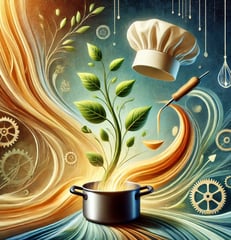

Mindset Is the Secret Sauce:
How a Growth Mindset Fuels Culinary Success
Steve Weiss, ACC
Transformational Leadership Academy
In the culinary world, skill and technique often steal the spotlight. But here’s a secret that many top chefs will tell you: having a growth mindset can be even more important than knowing how to make the perfect hollandaise or julienne a carrot. What is a growth mindset, and why does it matter so much in the kitchen? Let’s break it down.
What Is a Growth Mindset?
A growth mindset is the belief that your abilities and intelligence can be developed through effort, learning, and persistence. It’s the opposite of a fixed mindset, where people believe that their talents are set in stone—either you have it, or you don’t.
In the kitchen, having a growth mindset means:
Being open to feedback and seeing it as a chance to improve.
Viewing mistakes as opportunities to learn, not as failures.
Staying curious and always seeking to build on your skills.
Real Story: Chef Thomas Keller’s Journey to Success
Thomas Keller, the acclaimed chef behind The French Laundry, didn’t achieve success overnight. In fact, his first restaurant venture, Rakel, failed. He was devastated but chose to view it as a learning experience rather than a final defeat. Keller has spoken openly about how this setback taught him invaluable lessons that he carried forward into his next ventures. Instead of giving up, he spent years honing his craft, working in various kitchens, and learning from his mistakes.
Keller once said, “You learn more from losing than winning. You learn how to keep going.” His growth mindset allowed him to use failure as fuel for future success.
How a Growth Mindset Plays Out in the Kitchen
You don’t need to be a Thomas Keller to see the impact of a growth mindset. Here’s how it can show up in your daily work:
Embracing Feedback:
It can be tough when a chef yells at you for overcooking the fish, but feedback is a powerful tool for growth. Instead of feeling defeated, ask yourself: What can I do better next time?
Real Quote: Chef Gordon Ramsay, known for his harsh critiques, often says, “The minute you stop learning, you're dead.” It’s his way of pushing cooks to keep striving for better.
Turning Mistakes into Lessons:
Did you burn the sauce? Mess up a dish? It happens to everyone. The difference is what you do next. A fixed mindset says, “I’m just not good at this.” A growth mindset says, “What went wrong, and how can I fix it?”
Real Story: Chef Dominique Crenn, the first woman in the U.S. to earn three Michelin stars, often tells the story of how she once ruined an entire batch of her signature dish because she forgot to set a timer. Instead of giving up, she spent hours analyzing what went wrong and experimenting until she perfected it.
Seeking Out Challenges:
Don’t shy away from tasks that seem too hard. Whether it’s learning a new technique or handling a difficult prep job, tackling challenges head-on is how you grow.
Example: Chef David Chang of Momofuku fame has built his entire career on pushing boundaries. He’s said, “If you’re not making mistakes, you’re not trying hard enough.” This mindset has led him to create innovative dishes that have revolutionized the industry.
The Science Behind It
According to psychologist Carol Dweck, who coined the term “growth mindset,” people who believe they can improve their skills tend to achieve more than those who think their talents are fixed. Dweck’s research shows that when we embrace a growth mindset, our brains actually form new connections and get stronger. This means that every time you practice a new skill or seek out feedback, you’re literally training your brain.
How to Cultivate a Growth Mindset in the Kitchen
If you want to develop a growth mindset, here are some practical steps to start with:
Ask for Feedback Regularly: Don’t wait for performance reviews. Approach your chef or peers and ask, “What could I have done better on this dish?”
Reflect on Your Day: At the end of each shift, think about what you learned. Did you try something new? Did you make a mistake? Write it down and consider what you’ll do differently next time.
Celebrate Effort, Not Just Results: It’s easy to get caught up in perfection, but remember to acknowledge the effort you put in, even if the result wasn’t perfect.
Adopt a “Yet” Mentality: When you catch yourself thinking, “I can’t do this,” add the word yet. It turns a negative thought into a growth-oriented one: “I can’t do this...yet.”
Final Thoughts: The Growth Mindset Recipe
In the kitchen, having a growth mindset can be your secret ingredient for long-term success. It’s about more than just getting better at cooking—it’s about becoming a better learner, a better team player, and a better problem-solver.
Next time you face a challenge in the kitchen, remember this quote from Chef Massimo Bottura: “There’s no such thing as a perfect recipe, only a perfect attitude.” That’s the essence of a growth mindset.
Ready to grow? Start by embracing your mistakes and looking for opportunities to learn from every shift. Because in the culinary world, just like in life, growth is always on the menu.
Contact Info
steve@leadwithtla.com
216-288-4548
